外研版七年级下module11unit2
外研版英语七年级下册:Module 11 Unit 2 Here are some ways to
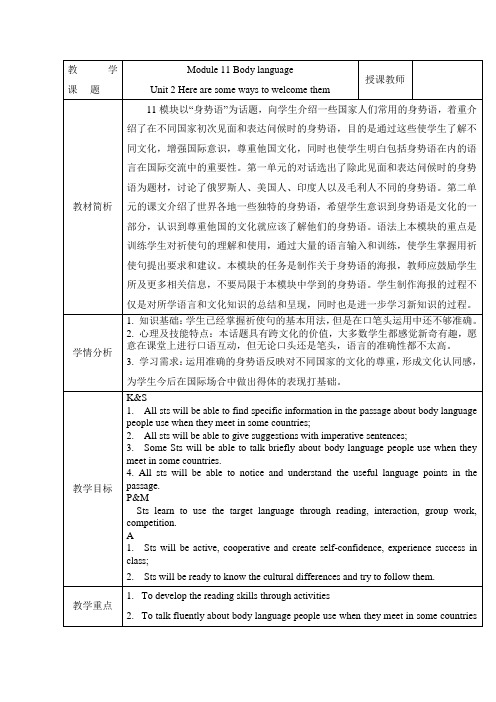
Warming up:gamesand talkto review what have learnt about body language
Reading activities:Read for info. read to answer, read for language, read for retelling…
3. Some Sts willbe able to talk briefly about body language people use when they meet in some countries.
4. All stswill be able to notice and understand the useful language points in the passage.
Group work: Discuss and tell about body language people use when they meet.
教学过程
教学环节
教学活动
设计意图
Step I Warming up and leading in:
Step II Fast reading
Step III Reading activities:
To review and test their memory of t
To learn to find the main idea by topic sentences
To learn to find specific info.
To learn the languagethrough reading
2. Sts will be ready to know the cultural differences and try to follow them.
外研版七年级英语下 Module_11__Body_language_Unit_2__Here_are_some_ways_to_welcome_them_hhh.

shake hands and smile when they meet. They usually __________
Where are they from?
Maybe
They are from America. They are American. How do they greet? They usually _______________ shake _________ kiss _______________________ hands, when they meet. or hug each other
In Greece, it’s not at all polite! In fact, it’s very rude.
wave to say goodbye be careful in fact
挥手告别 小心 事实上
语法讲解----祈使句
But be careful!
1.—Don’t be late again, Mike? —_______________. A. No, I don’t C. Sorry, I won’t B. Don’t worry D. I don’t know
Maybe
Where are they from? They are from New Zealand. They are Maori. How do they greet?
They touch noses.
You know, when we meet others, we often use our body to greet each other. Now, let learn about our body.
head
ear
外研社七年级下Module 11 Unit 2课件
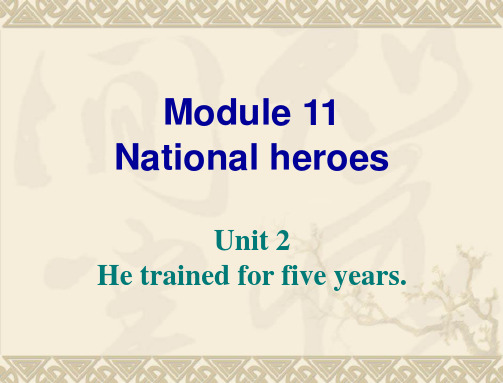
5. a journey through the air flight of space ________ 6. to stop work and relax ________ rest orbit 7. to go round the Earth ________ 8. arrive at ________ reach 9. to become part of ________ join 10. someone who many people like ________ hero
Language goal: 1. To get the information from the reading material about personal information. 2. To get a brief idea of newspaper articles.
Drilling: Activity 2 Key points: China’s and Chinese, …ago, be called, 14 times, last + 时间, 38-year-old, the next day, the third, 11 years later, on Earth, wave to.
Module 11 National heroes
Unit 2 He trained for five years.
Talk about the hero in your heart.
1. Who is he / she? 2. When and where were they born? 3. Why are they famous? 4. What did they do? 5. Why do you like them?
外研社七年级英语下册Module11Bodylanguage知识点复习(最新整理)

MODULE 11短语1.body language 身体语言2.touch noses 碰鼻子touch v.接触、触摸、打动n.接触、联系、关系be/keep in touch with 和…保持联系get in touch with 和……取得联系3.nod head 点头4.in different countries在不同的国家5.shake hands 握手shake hands with… 和…握手6.three times 三次7.each other 互相所有格形式:each other’seach of 后面接复数名词或代词复数,但做主语的时候,谓语要用单数。
Each of us has to take one. each 做主语。
我们每个人必须拿一个We each have to take one. we是主格,做主语。
8.best friend 最好的朋友9.film star 电影明星10.foreign students 外国学生11.talk to… 与….交谈talk with… 和….交谈talk about… 谈论关于…12.stand close to 站得近be close to…离…近13.personal space 私人空间14.arm in arm 臂挽臂hand in hand 手拉手face to face 面对面shoulder to shoulder 肩并肩15.south Americans 南美人16.move away 离开,搬走move on 继续移动17.not at all 一点也不18.be polite to do … 做…是礼貌的19.look at 看20.in other countries 在其他国家21.say goodbye 道别say goodbye to 向…道别,向…分手say hello to 和…打招呼say sorry to 向…道歉22.wave to say goodbye 挥手说再见23.be careful = Take care!=look out 小心24.in fact 事实上25.hold on to… 抓紧Hold on, please. 等一会儿26.be late for class 上课迟到27.class rules 班规28.in class 在课上29.stand in line 站成一排,排队30.on time 准时in time 及时31.enter the lab alone 独自进入实验室32.many other things 许多其他事情33.greet sb. 问候某人34.bring, take与carrybring 表示“拿来,带来”,指从别处把某人或某物带到说话人所在之处take 表示“带走,拿走”,指从说话人所在地把某人或某物带走或拿走carry仅表示“携带,带着”,不含方向句子:1. That’s because people do different things in different countries. 那是因为不同国家的人们做法不同。
【同步练习卷】外研版英语七年级下册 Module 11 Unit 2
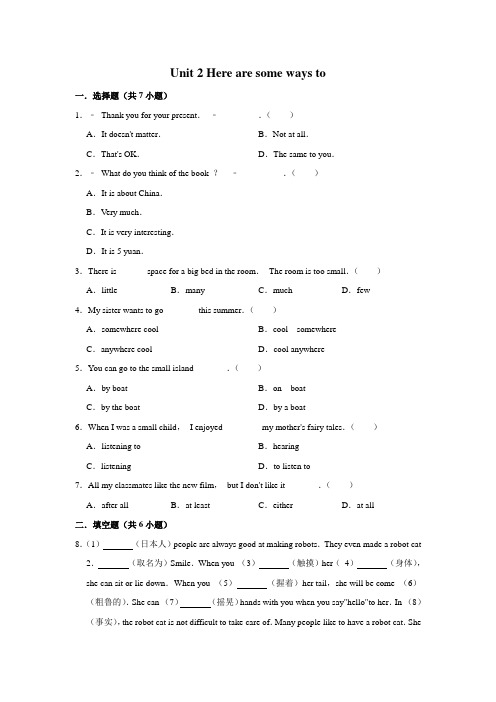
Unit 2 Here are some ways to一.选择题(共7小题)1.﹣Thank you for your present.﹣________.()A.It doesn't matter.B.Not at all.C.That's OK.D.The same to you.2.﹣What do you think of the book ?﹣_________.()A.It is about China.B.Very much.C.It is very interesting.D.It is 5 yuan.3.There is _____space for a big bed in the room.The room is too small.()A.little B.many C.much D.few4.My sister wants to go _______ this summer.()A.somewhere cool B.cool somewhereC.anywhere cool D.cool anywhere5.You can go to the small island _______.()A.by boat B.on boatC.by the boat D.by a boat6.When I was a small child,I enjoyed ________ my mother's fairy tales.()A.listening to B.hearingC.listening D.to listen to7.All my classmates like the new film,but I don't like it _______.()A.after all B.at least C.either D.at all二.填空题(共6小题)8.(1)(日本人)people are always good at making robots.They even made a robot cat 2.(取名为)Smile.When you (3)(触摸)her(4)(身体),she can sit or lie down.When you (5)(握着)her tail,she will be come (6)(粗鲁的).She can (7)(摇晃)hands with you when you say"hello"to her.In (8)(事实),the robot cat is not difficult to take care of.Many people like to have a robot cat.Shecan be your (9)(个人的)friend,being (10)(一起)with you all the time.9.wave,personal,hold,foreign,polite1.A:Is Mike rude to the old?B:No,he is a very boy.2.A:Li Fei,don't go out to play football this afternoon.B:Oh,Mum!Please give me some space!3.A:What is Xu Gang in his right hand?B:Sorry,I don't know.4.A:Why did you to that boy under the tree?B:Because he is my old friend.5.A:What does your uncle do?B:He is a manager in a big company.10.In some places,isn't polite look at people when you talk,but in other countries isn't polite look.在一些地方,你谈话时看着对方是不礼貌的,但在其他一些国家,你在交谈时看别的地方是不礼貌的.11.英汉互译.1.very soon2.arm in arm3.close to4.In the Middle East5.move away6.一点也不7.北美人8.事实上9.挥手道别10.小心..12.(not be)late for the meeting tomorrow.It's very important.13.Is it polite to look at each other when people talk in the US?.三.完形填空(共1小题)14.Everyone likes a polite person. A polite person knows(1)he should do and what he shouldn't do. He never makes others worry(2)him. He always tries his best to help others and make(3)comfortable. When people are(4)in line for a bus,or in a cinema,he is always happy to wait for his turn.(5),he is nice to animals,too.He says "Please" when he asks for help and "Thank you" when he(6)something from others. He usually(7)when he talks to a lady or an old man,and he doesn't sit down(8)others sit down.However,people in different countries have different manners(礼仪). It's true that each (9)has its way of life. In China,people always (10)chopsticks(筷子)to have meals. You should (11)point at others with your chopsticks. In Germany,when your friend sees(12)in your bowl,he will give you more food because he thinks you may still be(13). In fact,it's not (14)to be nice and friendly to others. Remember these,(15)you'll be a polite person.(1)A.why B.what C.when D.how(2)A.on B. for C. with D. about(3)A. them B. us C. you D. it(4)A. leaving B. looking C. waiting D. sending(5)A. Anyway B. Again C. Finally D. Certainly(6)A. pays B. receives C. returns D. brings(7)A. puts away B. tries on C. stands up D. looks up(8)A.so B. after C. until D. when(9)A. country B. festival C. story D. programme(10)A. sell B. shake C. touch D. use(11)A. almost B. sometimes C. always D. never(12)A. nothing B. something C. everything D. anything(13)A. fat B. hungry C. tired D. bored(14)A. interesting B. cheap C. difficult D. wonderful(15)A. because B. and C. but D. or四.补全对话(共1小题)15.ⅠⅡ1.Please talk politely.A.It's easy,wave to say goodbye.2.How do you say goodbye?B.Sorry,I won't.3.Please don't smoke here.C.He read some newspapers in thestudy.4.Do you know her name?D.OK,I will.5.What did Edward do?E.No.Let's go and ask.Unit 2 Here are some ways to参考答案与试题解析一.选择题(共7小题)1.﹣Thank you for your present.﹣________.()A.It doesn't matter.B.Not at all.C.That's OK.D.The same to you.【分析】谢谢你的礼物.不客气.【解答】考查常用日常交际用语.A.It doesn't matter.没关系.B.Not at all.不客气.C.That's OK.没问题.D.The same to you.你也一样.根据Thank you for your present.可知应说不客气.故选:B.【点评】理解各个选项的含义,根据Thank you for your present.结合选项作答.2.﹣What do you think of the book ?﹣_________.()A.It is about China.B.Very much.C.It is very interesting.D.It is 5 yuan.【分析】你觉得这本书怎么样?这是非常有趣的.【解答】考查常用日常交际用语.A.It is about China.是关于中国的.B.Very much.非常.C.It is very interesting.这是非常有趣的.D.It is 5 yuan.5元.根据What do you think of the book ?可知应说这是非常有趣的.故选:C.【点评】理解各个选项的含义,根据What do you think of the book ?结合选项作答.3.There is _____space for a big bed in the room.The room is too small.()A.little B.many C.much D.few【分析】房间里放了一张大床几乎没有空间了.房子太小了.【解答】A.考查形容词辨析.little,几乎没有修饰不可数名词,much许多,修饰不可数名词.space,表示"空间"是不可数名词.根据The room is too small可知,房子里几乎没有空间.故选:A.【点评】形容词辨析要先读懂题干,根据题干选出恰当的形容词.4.My sister wants to go _______ this summer.()A.somewhere cool B.cool somewhereC.anywhere cool D.cool anywhere【分析】我妹妹想今年夏天去个凉爽的地方.【解答】somewhere某地,cool凉爽的;形容词修饰不定代词,形容词后置,此题根据语境:我妹妹想今年夏天去个凉爽的地方.故选:A.【点评】此题考查不定代词,在熟知不定代词意思和用法的基础上,结合具体题目,仔细分析,便可得出正确答案.5.You can go to the small island _______.()A.by boat B.on boatC.by the boat D.by a boat【分析】你可以坐船去那个小岛.【解答】乘船by boat;结合句意"你可以坐船去那个小岛"可知,要选"乘船",其它选项都有语法错误.故选:A.【点评】介词的用法多体现在短语中,所以牢记住每个介词短语的用法,对于介词短语的辨析很有帮助.6.When I was a small child,I enjoyed ________ my mother's fairy tales.()A.listening to B.hearingC.listening D.to listen to【分析】当我是小孩子的时候,我喜欢听我妈妈的童话故事.【解答】答案:A.enjoy 后面要跟动名词,故可排除D.listen 要和to 搭配,故可排除C.B.hear 是"听见,听到",意思不合适.根据句意"当我是小孩子的时候,我喜欢听我妈妈的童话故事".可知BCD句意不合.故选:A。
外研版英语七年级下册Module11课文+知识点
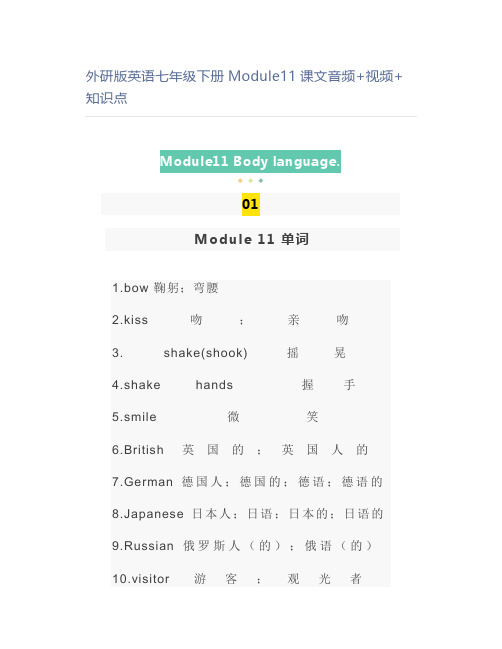
外研版英语七年级下册Module11课文音频+视频+知识点◆◆◆01Module 11 单词1.bow 鞠躬;弯腰2.kiss 吻;亲吻3. shake(shook) 摇晃4.shake hands 握手5.smile 微笑6.British 英国的;英国人的7.German 德国人;德国的;德语;德语的8.Japanese 日本人;日语;日本的;日语的9.Russian 俄罗斯人(的);俄语(的)10.visitor 游客;观光者11.Russia 俄罗斯12.what 什么(表示惊奇)13.nod 点(头)14.head 头;头部15.hug 拥抱;紧抱16.each 各个;每个17.each other 互相;彼此18.India 印度19.together 一起;共同20.Maori 毛利人的21.touch 触摸;接触22.nose 鼻子23.finger 手指24.foot 脚;足25.knee 膝盖26.leg 腿27.mouth 口28.body 身体,躯干29.foreign 外国的30.North American 北美人31.personal 个人的32.arm in arm 臂挽臂地33.South American 南美人34.hold 握着;使不动35.move 移动36.Britain 不列颠;英国37.not at all 一点也不38.polite 礼貌的39.somewhere 某处;某地40.wave 挥(手);招(手)41.fact 事实;细节42.in fact 事实上43.rude 粗鲁的;无礼的44.bring 带来02Module 11课文动画外研版七年级下册Module 11 Unit 1 课文动画外研版七年级下册Module 11 Unit 2 课文动画03Module11知识梳理【重点短语】1. body language 肢体语言3. nod head 点头4. best friend 最好的朋友5. shake hands 握手6. each other 互相8. foreign students 外国学生9. in fact 事实上7. stand close to 站得离......近8. be late for class 上课迟到9. move away 离开,搬走10. class rules 班规11. listen to 听12. stand in line 站成一排13. enter the lab alone 独自进入实验室14. on time 准时,按时【重点句型】1. I’m welcoming th e visitors.我要去迎接这些参观者。
外研版七年级英语下册模块11答案部分
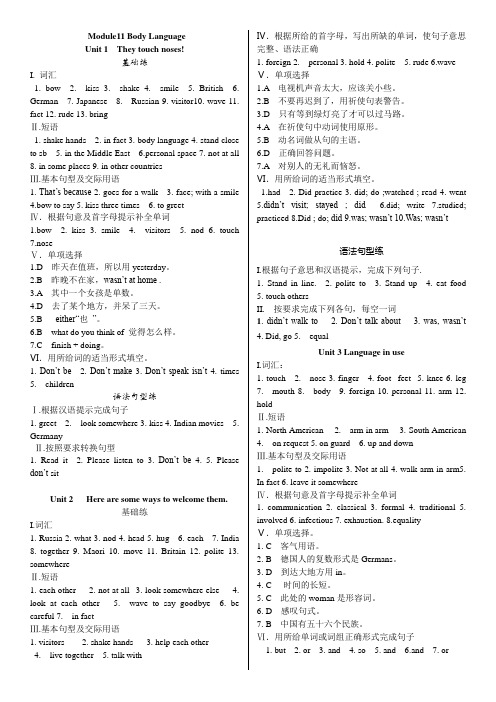
Module11 Body LanguageUnit 1 They touch noses!基础练I. 词汇1. bow2. kiss3. shake4. smile5. British6. German7. Japanese8. Russian9. visitor10. wave 11. fact 12. rude 13. bringⅡ.短语1. shake hands2. in fact3. body language4. stand close to sb5. in the Middle East6.personal space7. not at all8. in some places9. in other countriesⅢ.基本句型及交际用语1. That’s because2. goes for a walk3. face; with a smile4.bow to say5. kiss three times6. to greetⅣ.根据句意及首字母提示补全单词1.bow2. kiss3. smile4. visitors5. nod6. touch7.noseⅤ.单项选择1.D 昨天在值班,所以用yesterday。
2.B 昨晚不在家,wasn’t at home .3.A 其中一个女孩是单数。
4.D 去了某个地方,并呆了三天。
5.B either“也”。
6.B what do you think of 觉得怎么样。
7.C finish + doing。
Ⅵ.用所给词的适当形式填空。
1. Don’t be2. Don’t make3. Don’t speak isn’t4. times5. children语法句型练Ⅰ.根据汉语提示完成句子1. greet2. look somewhere3. kiss4. Indian movies5. GermanyⅡ.按照要求转换句型1. Read it2. Please listen to3. Don’t be4.5. Please don’t sitUnit 2 Here are some ways to welcome them.基础练I.词汇1. Russia2. what3. nod4. head5. hug6. each7. India8. together9. Maori 10. move 11. Britain 12. polite 13. somewhereⅡ.短语1. each other2. not at all3. look somewhere else4. look at each other5. wave to say goodbye6. be careful7. in factⅢ.基本句型及交际用语1. visitors2. shake hands3. help each other4. live together5. talk with Ⅳ.根据所给的首字母,写出所缺的单词,使句子意思完整、语法正确1. foreign2. personal3. hold4. polite5. rude6.wave Ⅴ.单项选择1.A 电视机声音太大,应该关小些。
2023年外研版七年级英语下册Module11 Unit2 Here are some ways t
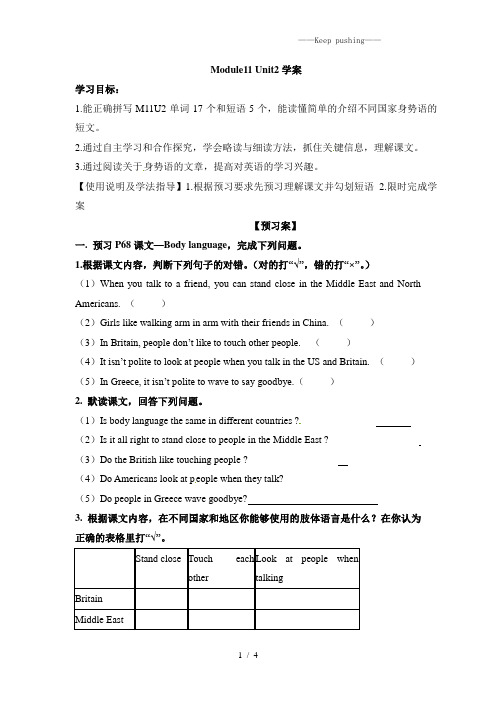
Module11 Unit2学案学习目标:1.能正确拼写M11U2单词17个和短语5个,能读懂简单的介绍不同国家身势语的短文。
2.通过自主学习和合作探究,学会略读与细读方法,抓住关键信息,理解课文。
3.通过阅读关于身势语的文章,提高对英语的学习兴趣。
【使用说明及学法指导】1.根据预习要求先预习理解课文并勾划短语 2.限时完成学案【预习案】一. 预习P68课文—Body language ,完成下列问题。
1.根据课文内容,判断下列句子的对错。
(对的打“√”,错的打“×”。
)(1)When you talk to a friend, you can stand close in the Middle East and North Americans. ( )(2)Girls like walking arm in arm with their friends in China. ( )(3)In Britain, people don’t like to touch other people. ( )(4)It isn’t polite to look at p eople when you talk in the US and Britain. ( )(5)In Greece, it isn’t polite to wave to say goodbye.( )2. 默读课文,回答下列问题。
(1)Is body language the same in different countries ?_______________(2)Is it all right to stand close to people in the Middle East ?__________________(3)Do the British like touching people ?__________________ _(4)Do Americans look at p eople when they talk?_________________________(5)Do people in Greece wave goodbye?3. 根据课文内容,在不同国家和地区你能够使用的肢体语言是什么?在你认为正确的表格里打“√”。
外研版英语七年级下册Module11Unit2Here+are+some+ways+to
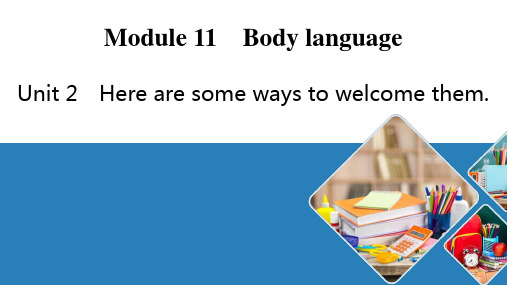
语言点精析
要点1:(P68)You can stand close to people in the Middle East but don't stand too close to North Americans!
在中东,你可以站得离人们近些,但是不要站得离北美人 太近!
【重点探究1】 close作副词,意为“接近地”,常用短语:close to意为 “离……近”。
( T )5.In Greece, it isn't polite to wave to say goodbye.
二、请认真阅读教材P68课文内容,把下面的短文补充完 整
Here are some 1.___w_a_y_s__ to welcome new foreign students.In 2.___B_r_i_ta_i_n___,people don't like to touch others, but in South America, they like to 3.___h_o_l_d__ your arm so you can't 4.__m__o_v_e__ away.Remember to 5.___g_iv_e___ someone from North America lots of 6.___p_e_r_s_o_n_a_l__ space.In some countries, it isn't 7.___p_o_li_t_e___ to look at people when you talk.And it isn't polite to 8.___w_a_v_e__ to say goodbye in Greece.In 9.___f_a_c_t __,it's quite 10.__r_u_d_e___.
七年级英语下册Module11BodylanguageUnit2Herearesomewaystowelcomethem同步测试(新版)外研版(含答案)

Unit 2 Here are some ways to welcome them.A组基础知识一、根据音标写单词1. /m/2. /s mwe/3. /f r n/4. /maθ/5. /brItn/二、根据句意及汉语提示完成句子1. Danny is a very (有礼貌的) boy.2. Oh, Mum!Please give me some (个人的) space!3. It’s (无礼的) to speak to your parents in that way.4. —What is Xu Gang (握着) in his right hand?—Sorry, I don’t know.5. I go to school on (脚,足).三、用所给词的适当形式填空1. It’s (polite) to t alk loudly in the reading room.2. The (Britain) people speak English.3. You must be (care) when you cross the road.4. What about (go) for a ride in the park?5. (not be) late for class, boys and girls.四、句型转换1. You can’t eat candy in class. (改为祈使句)candy in class.2. Please give me an eraser. (改为同义句)Please an eraser .3. It rained yesterday. They didn’t go to the concert. (合并为一句)It rained yesterday, they didn’t go to the concert.4. To keep the classroom clean and tidy is important. (改为同义句)important the classroom clean and tidy.5. Stand too close to North Americans. (改为否定句)too close to North Americans.B组能力提升一、阅读理解Different countries have different customs in giving presents.In China you must never give a clock to a Chinese person, because the sound of the word “clock”is similar to the sound of “death”. Also, don’t wrap(包裹) a present in white, black or blue paper, because they are the colours for funerals(葬礼). Don’t give a knife, because something sharp can cut a friendship.In Russia if you give flowers as presents, you have to give an odd number of them(one, three, five, etc.) because even numbers of flowers are for funerals.In Germany if you are invited to dinner, a bunch of flowers is a good present to take to your dinner hostess(女主人), but don’t take her red roses because it means you are in love with her. Don’t take thirteen of anything because it’s an unlucky number. Don’t take an even number of anything, either. Don’t wrap your presents in whit e, brown or black paper.()1. According to the passage, must never be given to Chinese people as presents.A. flowersB. clothesC. foodD. clocks()2. People don’t wrap presents in black or white paper in .A. GermanyB. ChinaC. both China and GermanyD. both China and Russia()3. What does the underlined word “even” mean in Chinese in the passage?A. 偶数的B. 奇数的C. 甚至D. 平坦()4. What present can you take to your dinner hostess in Germany?A. Thirteen of s omething.B. Flowers except red roses.C. An even number of something.D. Something wrapped in brown paper.()5. Which is the best title for the passage?A. Foreigners’ PresentsB. Giving Flowers as PresentsC. Different Customs in Giving PresentsD. Don’t Give Thirteen of Anything as Presents二、用方框中所给单词或短语的适当形式填空Apolite move wave bring body1. My best friend to Beijing last year.2. We usually to say goodbye when our friends leave.3. A nose is a part of a .4. In some places, it’s not to look at people all the time when you talk to them.5. Little Peter his father’s mobile phone to school yesterday.Bnot at all point at in fact personal space close to6. Don’t let the students do too much homework. Please give them more .7. The teacher the blackboard and said, “You must look carefully.”8. , I don’t like to tou ch little dogs.9. The girl is shy with them.10. The British don’t like to stand each other.三、根据短文内容及汉语提示完成短文What do we do if we have something to tell others or if we want to learn something fromothers? Yes, we1 (使用) our language, that is, either spoken language or written language. But in2 (事实), there is another kind of language and it is also very3 (重要的). Do youknow what it is? Yes, that is4 (身体) language. Can you tell me something aboutbody language? For example, if you5 (赞同) with what I said just now, what do you do? And if you d on’t agree with whatI said, what do you do? But 6 (有时) the same gesture means different things indifferent 7 (国家). For example,8 (某处) in the world 9 (点头) head doesn’t mean YES. So if you visit a 10 (外国的) country, only speakingits language very well isn’t enough.四、语法填空阅读下面短文,按照句子结构的语法性和上下文连贯的要求,在空格处填入一个适当的词或使用括号中词语的正确形式填空(每空不多于2个单词)。
外研版Module11,Unit2教学设计
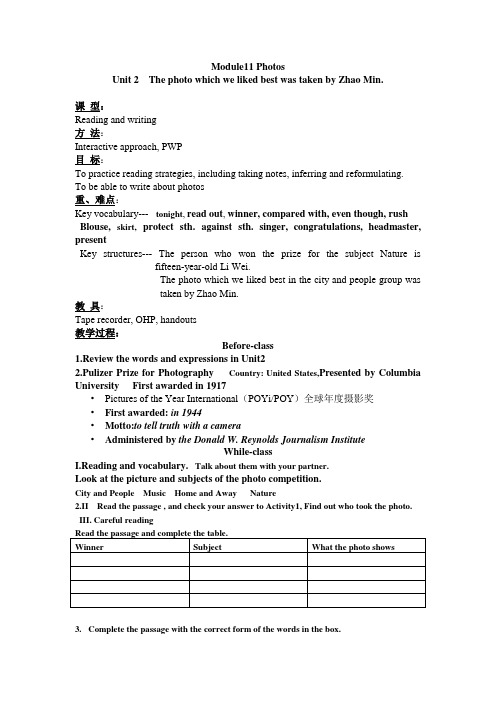
Module11 PhotosUnit 2 The photo which we liked best was taken by Zhao Min.课型:Reading and writing方法:Interactive approach, PWP目标:To practice reading strategies, including taking notes, inferring and reformulating.To be able to write about photos重、难点:Key vocabulary---tonight, read out, winner, compared with, even though, rush Blouse, skirt,protect sth. against sth.singer,congratulations,headmaster, presentKey structures--- The person who won the prize for the subject Nature is fifteen-year-old Li Wei.The photo which we liked best in the city and people group wastaken by Zhao Min.教具:Tape recorder, OHP, handouts教学过程:Before-class1.Review the words and expressions in Unit22.Pulizer Prize for Photography Country: United States,Presented by Columbia University First awarded in 1917•Pictures of the Year International(POYi/POY)全球年度摄影奖•First awarded: in 1944•Motto:to tell truth with a camera•Administered by the Donald W. Reynolds Journalism InstituteWhile-classI.Reading and vocabulary.Talk about them with your partner.Look at the picture and subjects of the photo competition.City and People Music Home and Away Nature2.II Read the passage , and check your answer to Activity1, Find out who took the photo. III. Careful readingplete the passage with the correct form of the words in the box.blouse present tonight windy winnerThe headmaster (1) _________ the prizes to the (2) _______ of the photo competition (3) ________. Li Wei won the prize for the subject Nature. In the City and People group, Zhao Min won a prize with a photo of a girl who wears a (4) _________ and skirt rushing across the road, on a (5) ________ evening in the rain. He Zhone won the prize in the Music group, and Tony Smith won the prize for the sunject Home and Away.nguage points1). We were very pleased with our competition this year.我们对今年的摄影比赛十分满意。
英语:Moudle11 Unit2课件(外研社七年级下2013春季版)
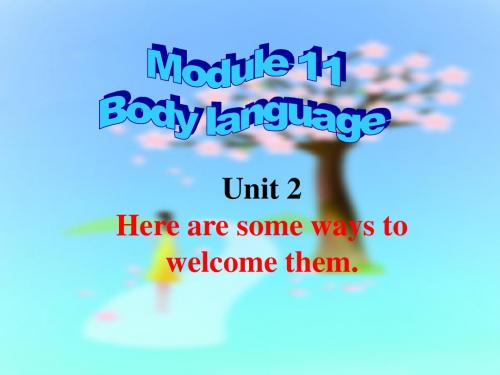
— Shall we stand up when we answer a question in class? — Yes, we shall.
6 Make a list of class rules for new students in your school. Stand up when you answer a question in class. Don’t be late for class. Be polite to the teacher. Don’t eat food in class. …
Where they are from?
How do they greet?
Maybe
They are from Russia. They are Russian.
Kiss three times when they meet. They usually _____________
Where are they from?
We put our thumb up to say “ good”
Walk arm in arm
Wave to say goodbye
Wave to say hello
In many countries, it’s polite to wave to say goodbye or hello. But in Greece, it’s not at all polite. In fact, it’s very rude.
Language points
Do you look at people when you talk? In some places, it isn’t polite to look at people when you talk, but in other countries it isn’t polite to look somewhere else. In Britain and the US, people usually look at each other when they talk.
Module11Unit2课件外研版英语七年级下册

Some places When you talk,i_t _is_n_’_t _p_o_li_te__to__lo_o_k__a_t _p_e_o_p_le_.
Looking
Other countries
_I_n_B__ri_t_ai_n_a_n_d__th_e__U_S__, when they talk they usually look at people.
Module 11 Body language
Unit 2 Here are some ways to welcome them
Revision
What coWunhtircihespaarrets of bodyWmhaayt’psetohpelebody language
mentioned(提us到e i)ninthUenfoitll1o?wing bodyoflathnegsueacgoeu?ntries? mouth
India
greeting the tour guide in India?
Post-reading Think and say
Why would people use different body language in different countries?
Because in different countries, the culture and tradition are different.
Ways Countries/areas
Body language
Standing
_M__id_d_l_e_E__as_t_ North America
You can stand close to people. You should _g_iv_e__th_e_m__m__o_re__p_e_rs_o_n_a_l_s_p_a_c_e_.
七年级下册英语第11单元

外研版英语七年级下册Module 11 Body languageUnit 1 They touch noses !课文:Lingling:We’re going to have some Russian teachers at school tomorrow , and I am welcoming the visitors .How do I do that?Betty :Lingling , you know , in Russia , people usually kiss three times , left , right , left .Lingling: What! No, I didn’t know that. We Chinese often shake hands and smile when we meet visitors, and sometimes we nod our heads. But we never kiss. Only parents and children do that.Betty : That’s because people do different things in different countries .Lingling : So what do people in the US usually do when they meet ?Betty : In the US some people shake hands , and some kiss or hug each other . In India, people put their hands together and nod their heads. And do you know what Maori people in New Zealand dowhen they meet?Lingling : No. What do they do?Betty : They touch noses !Unit 2 Here are some ways to welcome themBody language around the worldBy Wang Lingling Our new foreign students are going to arrive very soon, and here are some ways to welcome them.How close do you stand when you talk to a friend? You can sand close to people in the Middle East but don’t stand too close to North Americans! Give them more personal space.How about touching people? Chinese girls often walk arm in arm with their friends. South Americans sometimes hold your arm when they talk to you, so you can’t move away! But in Britain many people don’t like other people to touch them at allDo you look at people when you talk ?In some places, it isn’t polite to look at people when you talk, but in other countries it isn’t polite to look somewhere else. In Britain and the US, people usually look at each other when they talk.And how do you say goodbye ?That’s easy, wave to say goodbye. But be careful! In Greece, it isnot at all polite! In fact, it is very rude!。
教育部--Module11 unit2 He trained for five years--孟凡梅
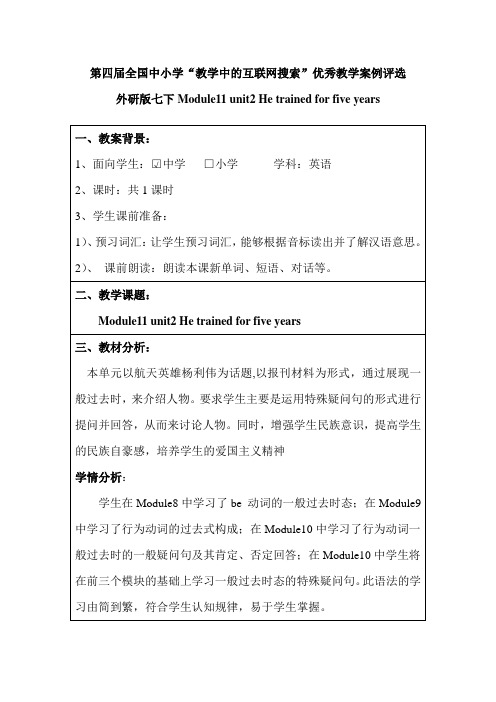
Step10、Watch a CD
/20120612/n345430485.shtml
设计意图:通过观看视频,让学生如身临其境,更直接的感知民族英雄杨利伟的崇高和伟大,激发学生的爱国精神。
六、教学反思
本节课通过看图片,让学生复习这些重要的单词,并向学生初步展示下文中的有关信息。以问题和图片引入课堂,生动形象,并点出了national hero和proud of him,引领学生进入民族意识、民族自豪感中。
听力问题设计到杨利伟的重要事件的时间,有利于学生掌握课文知识,更是突出了杨利伟为了航天事业所付出的代价,引导学生向他学习。
Step11、Get some information about shenzhou6、7 on the Internet
/show/9b_YUB5gyRMXC7Qp.html
/show/IYLv93CO5HGzMpap.html?from=my&loc=youcetuijian
Learn the new words: Space, Earth,wave,national flag, astronaut, spacecraft
设计意图:通过看图片,让学生复习这些重要的单词,并向学生初步展示下文中的有关信息。
Step3、Our national hero
Teacher : there are many national heroes . Who is your national hero?
/view/356ed9d97f1922791688e873.html(幻灯片41)
The headline,The latest news,The background,Today
外研版七年级下册英语Module 11 Body language 习题课件 Unit 2

9. Goodchancesalwayshide____s_o_m__e_w_h_e_r_earoundus, waitingforcarefulpeopletofindthem. 【中考·盐城】
10.—Didyougo_______B___lastsummerholiday? —Yes. IwenttoShanghaiDisney. 【中考·贵港】
9 saygoodbye 10 Infact; rude
题组专训
1 handinhand 6 C
2 arminarm
7 politely
答案呈现
11 B 12 B
3 totell
8 polite
13 Infact
4C
9 somewhere
5 atall
10 B
1C 2A 3D 4A 5B
课后巩固
18 notatall
23 can'ttalk
19 Infact
24 Giveme
20 talkingto
25 rudeto
课后巩固
答案呈现
26 use
31 sometimes
27 fact
32 countries
28 important
33 somewhere
29 body
34 nodding
30 agree
【点拨】用固定搭配法。saynoto意为“拒绝……”。
13. 事实上,我们不知道他的电话号码。 ________________, wedon'tknowhistelephonenumber.
Infact
一、单项选择
1. Myparentsarebothfarmers, C
外研版英语七下 .Module 11 U.2
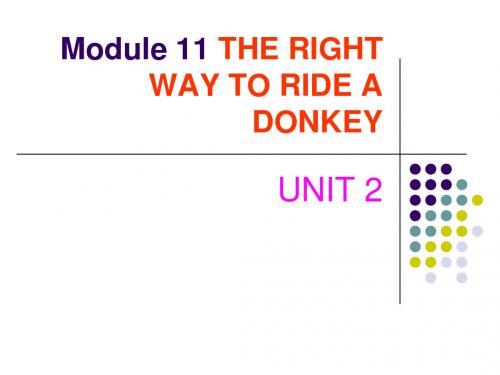
句型转换
1.He has bread and milk for breakfast,______ ______ ? doesn’t he (完成反义疑问句) 2.They don’t go to school at six, do they ? Yes, they do . (作肯定回答)___________________ 3.They meet different people on their way to the market .(就划线部分提问) Where do they meet different people ? _________________________________ 4. swimming, don’t ,you, like, you(连词成句) You like swimming ,don’t you ? ___________________________________ 5.The old man takes his grandson to the market .(改为 一般疑问句) Does the old man take his grandson to the market _____________________________________ ?
Read and write .
1.
2.
3.
4.
Who does the old man meet next ? an old woman He meets_____________________. What does the the woman tell the boy ? walk She tells him to_________________. Does the boy think the woman is right ? Yes,he does . ______________________________. What does the boy do ? The boy gets off the donkey . ______________________________.
外研版七下英语 Module 11 Body language Unit 2
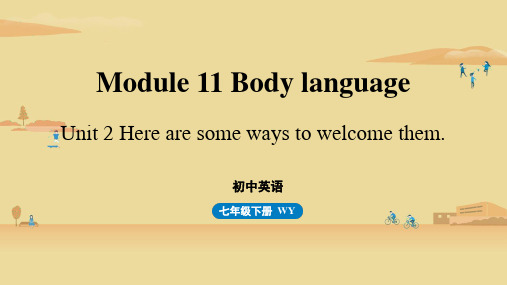
该类型短语还有:
shoulder to shoulder肩并肩地 back to back背靠背地 heart to heart 心连心 face to face面对面地 hand in hand手拉手地
South Americans sometimes hold your arm when they talk to you, so you can't move away! 南美人和你交谈时,有时会抓着你的胳膊,这样你就走不开了!(教材P68)
语境串记It's necessary to learn a foreign language. It can help you to communicate with foreigners when you go abroad. 学习一门外语是有必要的。当你出国时,它可以帮助你与外国人交流。
典例2 根据句意及汉语提示填写单词。(金华市金东区期末改编)As Zhang Haidi grew older, she learned ________(外国的) languages, such as English, Japanese and German.
典例4 用括号中所给词的适当形式填空。(百色中考) We should speak ________ (polite) when we talk to the elders.
politely
somewhere/ˈsʌmweə(r)/ adv. 某处;某个地方 [副词]被形容词修饰时,形容词应后置。通常用于肯定句,其前通常不加介词。Can we go somewhere interesting?我们能去个有趣的地方吗?
【随堂检测卷】外研版英语七年级下册 Module 11 Unit 2
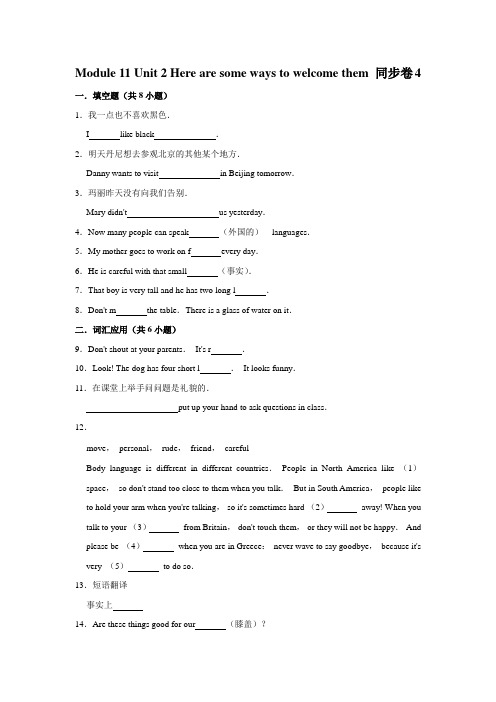
Module 11 Unit 2 Here are some ways to welcome them 同步卷4一.填空题(共8小题)1.我一点也不喜欢黑色.I like black.2.明天丹尼想去参观北京的其他某个地方.Danny wants to visit in Beijing tomorrow.3.玛丽昨天没有向我们告别.Mary didn't us yesterday.4.Now many people can speak(外国的)languages.5.My mother goes to work on f every day.6.He is careful with that small(事实).7.That boy is very tall and he has two long l.8.Don't m the table.There is a glass of water on it.二.词汇应用(共6小题)9.Don't shout at your parents.It's r.10.Look! The dog has four short l.It looks funny.11.在课堂上举手问问题是礼貌的.put up your hand to ask questions in class.12.move,personal,rude,friend,carefulBody language is different in different countries.People in North America like (1)space,so don't stand too close to them when you talk.But in South America,people like to hold your arm when you're talking,so it's sometimes hard (2)away! When you talk to your (3)from Britain,don't touch them,or they will not be happy.And please be (4)when you are in Greece:never wave to say goodbye,because it's very (5)to do so.13.短语翻译事实上14.Are these things good for our(膝盖)?三.阅读表达(共1小题)15.In the past,people used words to express their ideas and feelings.Now people have a new way to share their life with their friends on WeChat Moments (微信朋友圈).To make WeChat Moments,people can use pictures,sounds,videos and their words to express what they want to say.Some people don't write anything.They share what they are eating,drinking,listening to,buying and fun time by sharing pictures.Someone says that WeChat Moments are like personal TV stations.People don't have to spend money putting them on the Internet,so it is easy for people to make them and watch them on their phones.Only friends on the users' list can watch your WeChat Moments.WeChat businessmen even put the advertisements of their products(产品)on the WeChat Moments for their friends to choose and buy.WeChat Moments are becoming more popular among people.When we post(发表)something on it,we must be sure that the information should be healthy for people to read and watch.根据短文内容,回答下列问题(不超过6个单词).71.What did people use to express their ideas and feelings in the past?72.What can people use to make WeChat Moments?73.What's WeChat Moments like?74.Who can watch your WeChat Moments?75.What do WeChat businessmen put on the WeChat Moment?.Module 11 Unit 2 Here are some ways to welcome them 同步卷4参考答案与试题解析一.填空题(共8小题)1.我一点也不喜欢黑色.I don't like black at all.【分析】I don't like black at all.【解答】根据题干,可知考查句型not…at all根本不;结合时态为一般现在时,用助动词don't。
Module+11Unit2+课件+2022-2023学年外研版英语七年级下册
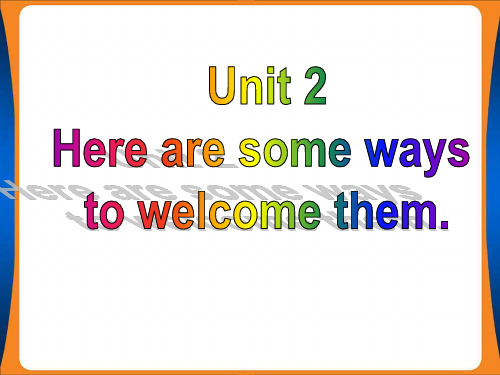
Where are they from?
They are from__I_n_d_i_a____. They are_I_n_d_i_a_n__p_e_o_p_l_e. They _p_u__t _h_a_n_d_s_t_o_g_e_t_h_e_r__when they meet.
Where are they from?
other people, but in South America, they
like to (3)__h__o_l_d__ on to you so you can’t (4)_m__o_v_e away.
Remember to (5)__g_i_v_e___ someone from North America lots of (6)_p_e__r_s_o_n_a_l_ space. In some countries, it isn’t (7)p__o_l_it_e_ to look
)
ways
close
When people say goodbye, they just wave to say goodbye.
look at
But in Greece, it's not all polite, it's rude.
We should follow (遵守)different bogdoyodlabnygeuages in different countries.
D . people from all over the world like touching others
( )5.The main idea of the passage is
.
A . people in different countries
- 1、下载文档前请自行甄别文档内容的完整性,平台不提供额外的编辑、内容补充、找答案等附加服务。
- 2、"仅部分预览"的文档,不可在线预览部分如存在完整性等问题,可反馈申请退款(可完整预览的文档不适用该条件!)。
- 3、如文档侵犯您的权益,请联系客服反馈,我们会尽快为您处理(人工客服工作时间:9:00-18:30)。
Check (√) the body language you can use in different countries and places.
Stand close Touch Look at people each other when talking
Britain
√ √ √
Middle East South America
Body language around the world
Our new foreign students are going to arrive very soon, and here are some ways to welcome them.
around the world foreign students very soon some ways to welcome them
P5
How do you say goodbye?
What’s the main idea of the passage?
Complete the passage with the words from the box.
Britain fact foreign hold move personal polite rude someone wave Lingling: People from (1)________ foreign countries have different body language from us. In (2)_______, Britain people don’t
US
√
1.You can stand…Middle East, but … North Americans. Give them…… 2. Chinese girls often… South Americans sometimes ……so you can’t… British don’t like……at all.
We liked to take photos arm in arm with her.
It wasn’t polite for her to look somewhere else when you talked.
When we finished school we waved to say goodbye.
Unit 2 Here are some ways to welcome them.
俄罗斯老师 迎接游客 在俄罗斯 握手 见来访者 点头
在不同国家 在美国
Russian teachers welcome the visitors in Russia shake hands meet visitors nod one’s head in different countries in the US put their hands together touch noses
Read the passage and answer the questions.
1. Can we stand close to people in
Middle East?
Yes, we can. 2. Is it polite to wave to say goodbye in Greece? No, it isn’t.
hห้องสมุดไป่ตู้ad
face
eye
nose
ear
head
mouth
tooth
teeth
hand fingers['fɪŋgə]
hands
arm [ɑːm]
legs
knee[niː]
foot
feet
Play a game
I had an oral speaking English(口语) teacher when I was in university. She was from New Zealand.
Maybe
How do they greet?
shake hands and smile when they meet. They usually __________
Where are they from?
Maybe
They are from America. They are American.
把手合拢
碰鼻子
那是因为
that’s because
Review
Where are they from?
Maybe
They are from Japan. They are Japanese. How do they greet? They usually bow each other when they meet.
Now, listen to the tape to answer the questions.
1. Is body language the same in different countries? No, it isn’t . 2. Is it all right to stand close to people in the Middle East? Yes, it is. 3. Do the British like touching people? No, they don’t. 4. Do Americans look at people when they talk? Yes, they do. 5. Do people in Greece wave goodbye? No, they don’t.
Read the passage again, then answer the question.
1. Is body language the same in different countries? No, it isn’t. 2. Is it all right to stand close to people in the Middle East? Yes, it is.
stand close to personal space arm in arm hold arm move away not at all somewhere else wave to say goodbye Middle East North America Greece-Greek
Language points
3. Do the British like touching people?
No, they don’t.
4. Do Americans look at people when they
talk?
Yes, they do.
5. Do people in Greece wave goodbye?
No, they don’t.
How do they greet? shake hands, They usually __________ _________ kiss or hug __________ each other when they meet.
Where is she from?
Maybe
She is from India. She is Indian. How do Indian people greet? put their hands together They usually ____________________ and ________________ nod their heads when they meet.
Key sentences
P1 P2 P3 P4
Here are some ways to welcome them.
How close do you stand when you talk a friend?
How about touching people? Do you look at people when you talk?
She liked to stand close to us when we talked with each other. Sometimes she even held our arms when she talked to us. So we couldn't move away.
She was not strict at all, and she gave us more personal space.
Where are they from?
Maybe
They are from Russia. They are Russian. How do they greet? kiss three times when they meet. They usually _____________
Where are they from? They are from China. They are Chinese.
arrive
全世界 外国学生 很快 一些欢迎他们的方式
in+大地点 at +小地点
How close do you stand when you talk to friend?
You can stand close to people in the Middle East
but don’t stand too close to North Americans! Give them more personal space. talk to/with sb close to in the Middle East North Americans personal space
3. In some places, it isn’t …to…,but it isn’t …to… British and the us usually… 4. How do you say goodbye? Wave to… In Greece, …it’s …
